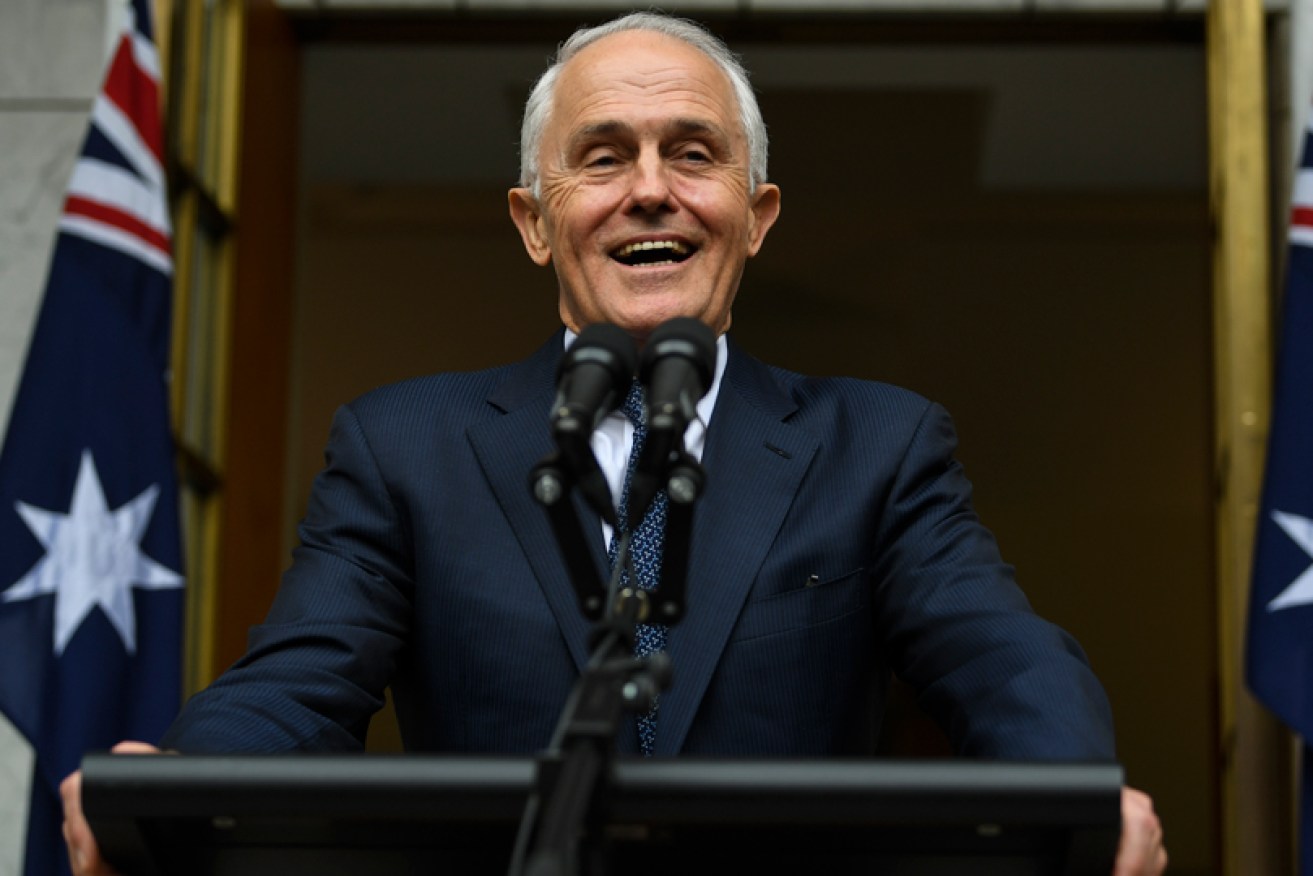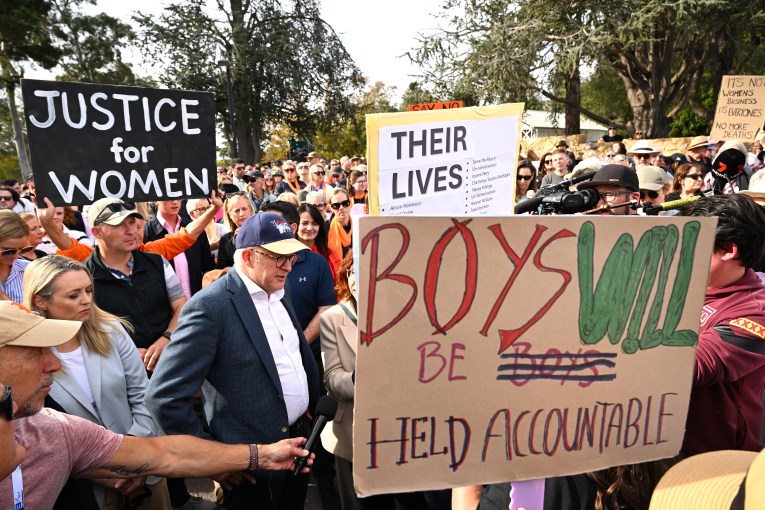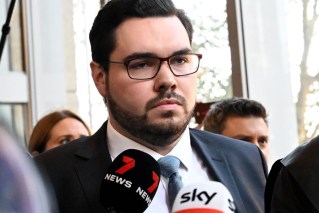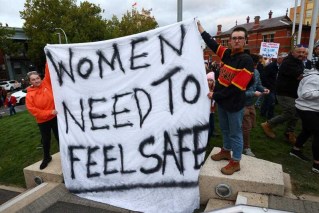Turnbull’s act of ‘bastardry’ sets up three-way fight


Prime Minister Malcolm Turnbull is not vacating his top job willingly. Photo: AAP
After legal advice from the solicitor-general’s office freeing up Peter Dutton to challenge Prime Minister Malcolm Turnbull, and a petition verifying signatures from 43 MPs confirmed, a showdown for the top job is underway in Canberra.
Treasurer Scott Morrison and Foreign Minister Julie Bishop also contenders to challenge Mr Turnbull at the party room leadership spill with reports Senator Mitch Fifield has switched support from Mr Dutton to Mr Morrison.
The prime minister demanded a list of 43 signatures from Liberal MPs before he agreed to call a second leadership spill within a week. The party whip sought to confirm the signatures before the party room meeting.
Mr Turnbull walked into the party room at 12.20pm on Friday with Small Business minister Craig Laundy and Arthur Sinodinos, who returned to Canberra from sick leave, by his side.
Ms Bishop and Mr Morrison walked into the meeting alone, while Mathias Cormann accompanied Mr Dutton.
Mr Dutton’s key supporters are confident tensions will be brought to a head.
“I believe he will be able to reconnect with the Howard battlers, bring them back in the Liberal fold,” Senator Mathias Cormann told Sky News on Friday.
Senior minister Christopher Pyne said none of his colleagues should tell Mr Turnbull what to do.
“I think some people of the caucus should have considered the greater good of the people of Australia and the government rather than their self-interested ambition,” he told reporters outside Parliament House.
Pressure has been mounting all week on Mr Turnbull to settle the leadership chaos on Friday, regardless of the petition. The Liberal Party’s national executive, and all state presidents, have reportedly demanded the Prime Minister settle the leadership question, senior party officials revealed on Friday.
Earlier on Friday morning, the nation’s top legal adviser, Solicitor-General Stephen O’Donoghue, appeared to clear Peter Dutton of a potential breach of section 44 of the constitution, although the language was guarded.
Mr Dutton is, by all accounts, the right-wing candidate. According to Craig Laundy, a key backbench ally, he represents the “heartland” of Australia that is “often very, very conservative”. To Labor’s Wayne Swan, he is the darling of the “looney right”.
Next is Scott Morrison of the centre-right. He was once seen as a hard man, who led many of the most muscular policy measures – welfare crackdowns and boat turnbacks – Mr Dutton has since claimed.
His image has since softened. He sealed his loyalty to Mr Turnbull this week with a hug. Once the final challenge date was set, he emerged as a key contender with the badge of “compromise candidate”.
The late challenger was perpetual deputy Julie Bishop, who has served as second-in-charge to four Liberal leaders. There were widespread reports she was actively canvassing her numbers. She is, reportedly, deeply unpopular with the Liberal right, but, according to polls, the most electorally popular of the three.

Julie Bishop, Scott Morrison and Peter Dutton emerged as the frontrunners to replace Mr Turnbull. Photo: AAP
Who will win? Few commentators were willing to guess.
It will be a Liberal Party contest, but it has already had historic consequences for Australian democracy generally.
Perhaps Mr Turnbull’s final act, in the parliamentary seat reserved for the PM, was to vote for a motion that adjourned Parliament for several weeks, beyond the leadership chaos.
The obvious intent was to cancel a nationally-televised question time destined to be embarrassing. As 2pm neared, a flurry of ministers sent their resignations to the Prime Minister’s office, hoping to avoid a repeat of Wednesday, when Labor forced each Dutton supporter to re-pledge their loyalty to Mr Turnbull.
In the words of Tony Burke, “no government in living memory has said it’s all too hard, we’re just going home”. Labor had in fact adjourned Parliament at least twice in recent memory to pave the way for leadership spills – but had not cancelled question time.
Then, in the Senate in the afternoon, a decimated government could only field three ‘ministers-for-everything’. A beleaguered Simon Birmingham was forced to shoulder most of the burden, as leading lights Mathias Cormann, Michaelia Cash and Mitch Fifield sat glum and mute in their new seats at the back.
A bewildered Barry O’Sullivan, thrust on to the frontbench, could only interject to complain about the noise.
On Sky News, Peta Credlin, former chief of staff to Tony Abbott, told viewers she was “saddened” and “ashamed” by the leadership standoff.
As usual, her strongest criticism was reserved for Mr Turnbull. Ms Credlin said his conduct at a media conference earlier in the day was “brazen, contemptuous and menacing”.
The intensity of her response might have reflected the depth of Mr Turnbull’s cunning.
Unlike those before him, namely Kevin Rudd, Julia Gillard and Kevin Rudd again, the Prime Minister did not immediately bow to demands for a second vote. He did not resign. He did not, as far as we know, approach a potential successor (as Ms Gillard did, to Greg Combet).
Instead, he set the scene for a high noon challenge on Friday, and only if he was furnished with the names of insurgents – effectively making a secret ballot public. One Liberal MP, Tim Wilson, openly said he refused to sign the “suicide note”. ABC political veteran Barrie Cassidy called it a “very clever tactic”.
He went further, by tarnishing the appeal of his chief challenger, Mr Dutton, saying there were “very, very serious” doubts over his constitutional eligibility for the job.
And then, perhaps most audacious of all, Mr Turnbull threatened to resign from Parliament if replaced.
“Former prime ministers are best out of the Parliament,” he said.
His friend-turned foe, Barnaby Joyce, sensed the implicit threat – of a destabilising by-election and the risk that Labor could, without Mr Turnbull’s vote, win a no-confidence motion, triggering an immediate election.
Mr Joyce was appalled, deeming it a “very, very poor show”. In his view, Mr Turnbull had a duty to stay, even if he lost, to protect the government from falling.
“If loyalty has been given to you, loyalty is owed back,” he told the ABC.
As Ms Credlin put it: “This bastardry is beyond anything I imagined possible, even from him.”








